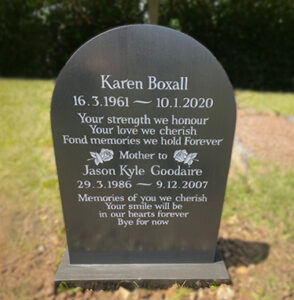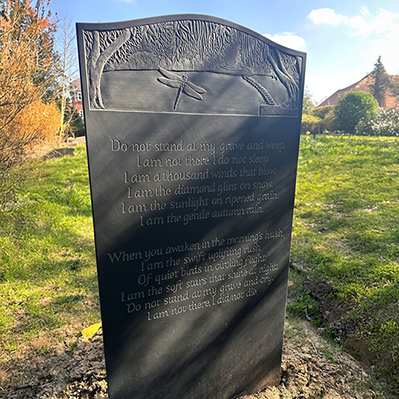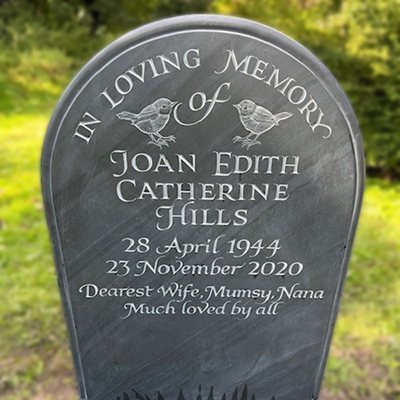Stone Type: Slate
Slate is a metamorphic rock formed from layers of shale or mudstone that have undergone pressure over millions of years. It is usually black-grey or green in colour with a mostly uniform surface appearance, and a paler inner which is revealed through carving. This difference in appearance can be exploited through sensitive lettercutting and carving choices.
Slate Stone Information Card
Stone Type: Welsh (black-grey) and Cumbrian (green) Slate
Colour Range: Dark grey to black or dark green outer, paler inner
Finish Options: Smooth finish for headstones
Durability Level: High
Porosity: Low (good water resistance)
Weather Resistance: Good (frost and rain resistant)
Maintenance Needs: Low (regular very gentle clean, avoid abrasion and impact damage)
Longevity: Can endure for centuries

Example of Slate Stone
Why consider slate stone?
Slate is an ideal material for memorials due to its hardness, which makes it durable with low porosity. This means that some of the impacts of weathering that you will see on other stone types, such as erosion or the growth of algae, do not occur.
Slate’s striking appearance makes it particularly suitable for bespoke handcarved projects and ornamentations. The contrast between the outer dark appearance and inner surfaces, which are paler grey, are appealing to the eye, and create beautiful shadows in the right lighting conditions. A handcut finish is most apparent on slate, enabling a true appreciation of the craft that has gone into its creation. It is also a traditional material with associations with local areas of the UK such as Wales and the northwest of England.
Slate is versatile as it can be both handcarved and sandblasted, and is acceptable in both churchyards and cemeteries. Maintenance needs to be handled carefully to avoid scratching the surface. Depending on the colour of the outer material, carvings and letterings can ‘disappear’ when the stone is wet so we may recommend they are painted with a grey wash to keep them visible at all times, and this may not be apparent until the carving has commenced.
There are some limitations on the size and shape of headstones available due to the ability of the quarries to produce high-quality stone of the correct size.
Pros
Highly durable and longlasting- resistant to weather and water
Versatile options for both handcarved and sandblasted finishes
Appropriate for all settings as both Churchyards and Cemeteries will permit slate memorials
Straightforward maintenance avoiding abrasive materials
Quarried in the UK in Wales and Cumbria/Westmoreland
Cons
Only simple shapes available due to limited supply from quarries
Can be scratched easily which prevents abrasive cleaning
Appearance is subject to variation in colour and the inner can have more or less contrast which is not apparent until the stone is carved
Higher cost due to its relative scarcity compared to some other materials
Examples of our work with slate stone...



Are you looking to creating a lasting tribute in slate stone?
Get in touch with our team, we are here to help.

